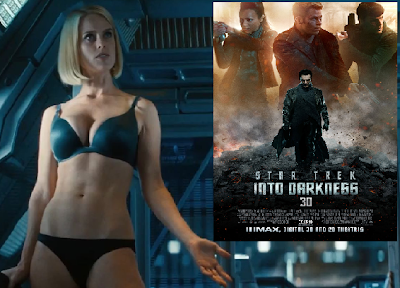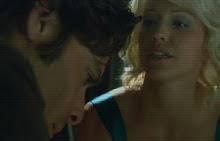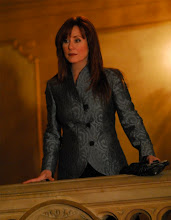Let's get this out of the way: JJ Abrams is vastly overrated as a writer and director. As a composer, I like him. As a producer, he's come up with some interesting projects but they rarely are cohesive and usually don't have good endings (LOST, Fringe, Cloverfield).
His second whack at Star Trek is due to come out soon (Star Trek Into Darkness), and it looks pretty terrible. The recent publicity stills features chicks and guns. JJ Abrams clearly does not understand or else intentionally disrespects Star Trek.
Spaceships, aliens, big themes and a journey of discovery - that is Star Trek. [When I reference Star Trek, I refer to the original series (TOS) as it is the only one that matters]
I am so hopeful he'll bow out of the next installment of Star Trek or that Viacom/Paramount will release him after "...Into Darkness" falls below expectations so he can then instead concentrate on reviving that tired Star Wars franchise.
As I noted in my review of his original Star Trek (linked here), he made ridiculous choices in terms of story, characters, casting, special effects and especially in his "re-imagining" of his alternate timeline of the story. The most egregious faults were his brewery subbing as the Engineering section, 40 shuttles, bug-eyed aliens and dwarf rock-monster aliens, the stupid swivel phasers, cheap-looking sets, the nauseating Spock-Uhura romance, and especially the Plot Scrambler that put the right characters into the right chairs. The new film looks pretty bad, frankly. If the villain turns out to be Khan, Tremaine, Mudd, or a fucking tribble, who cares? It is not Trek- he's making Star Impossible Trek Mission.
Many fans already are quite apprehensive or outright dogging Star Trek Into Darkness given the storyline, trailers and promo visuals. Clearly it is not a spaceship on a journey (remember the "five-year mission"?), there don't seem to be any space battles, our hero (Kirk) is once again tentative and cocky whereas the Kirk of TOS was a man of high achievement and confidence. We get Spock vs. the Volcano for a sub-story that just seems idiotic even in the trailer (they couldn't beam the bomb into the volcano?). And the focus is on the villain - played by Brit-of-the-moment Benedict Cumberbatch (who got cast based upon his work in BBC's Sherlock Holmes reboot). Obviously Abrams and his creative team are trying to recapture the magic of the best of the films, Star Trek II: The Wrath of Khan - which boiled down to a test of wills between good guy Kirk and over-the-top villain Khan (in a brilliant hammy performance by Ricardo Montalban).
Abrams has had such a full plate over the years what with all his television series and other projects, it is hard to know how many of the bad choices are his. My insider at Paramount tells me that Abrams is very hands-on and often wants changes and to go over something several times before giving approval, so the blame should fall to him. It is his production company and his impramatur. I also blame his writers, Roberto Orci and Alex Kurtzman. They crafted the clunky dialogue and the terrible plot of the first film. They did some fun campy stuff (Xena, Jack of All Trades) in their early career but their big movies have been pretty lame: Cowboys and Aliens, Transformers, The Island. [Gah! Update: I checked the credits and Damon Lindelof is also a writer on this one - now for sure it will suck]
I sure hope Sumner Redstone of Viacom and Brad Grey of Paramount decide to cut Abrams loose from the next Star Trek. Any number of directors and writers could take over the franchise and keep the basic JJ reboot aesthetic and work with the story developments (and problems) Abrams, et al brought to it. I still think Dean Parisot deserves a crack at a Star Trek film since he's already made the best one (GalaxyQuest).
To fix it in the third film the new writer and director will need to work with the cheap gimmick of time-travel that Abrams, Orci and Kurtzman injected into the mix with 2009's Star Trek. It is fixable, but hamstrings the process. In my next post on this subject I'll show how it's done.
Subscribe to:
Post Comments (Atom)























































































































































2 comments:
I certainly agree that he doesn't understand Star Trek. The TV Series were all about examining the human experience and giving humanity a goal to shoot for. But I think J.J. Abrams is doing exactly what paramount wants him to. He's making star trek into a summer blockbuster franchise. Girls, guns, and explosions sell tickets and that's all the studio executives care about.
But it is sad what's happening to the franchise. I think we're all losing out on this.
Sorry, not related to this post but on BSG, just wanted to point you to this. I guess Apollo loved the ending. Here's Bamber in a recent interview (http://collider.com/jamie-bamber-monday-mornings-battlestar-galactica-finale-interview/):
Oh, 1,000%. I loved the ending! I loved everything about it. I’m not a very mystical person, but I even loved the angel thing. The yin to my yang not being there anymore, there was something profound about how we carry those closest to us with us, even when we’re not physically together anymore and can’t be. I angered a lot of people when I got rid of all technology because it was nothing but trouble, which is probably a slightly childish response to what happened, but I could totally have that reaction to the modern world, at times. I love things like that. Sci-fi fans are always going to react, but I’m not a sci-fi guy. I was in that sci-fi show, but I was always like, “Let’s not do the goofy sci-fi stuff. Let’s keep it political and real.” The beauty of the show was both aspects.
I was very pleased with the ending because I thought it was entirely human. I remember having many discussions with Ron Moore about it, before it happened, and I remember bringing him a Richard Dawkins book, The Ancestor’s Tale, all about a massive leap that humanity made 50,000 years ago and how they don’t know why, in the space of a very small number of years, man went from very backward to cave arts and tools and communal farming. Everything thinks language must have been the thing that clicked. I remember talking to Ron about that, and about how maybe there was some other influence.
I liked how it was all in the past, and not in the future. The ending was really about coming back to the characters and taking them all back to the beginning. Flashbacks before the mini-series and juxtaposing where they are now with where they were then, you saw how they’d all had huge transformations, and yet they’re still the same people. I know some people absolutely hated it, but it’s nice to provoke strong reaction.
Post a Comment